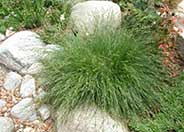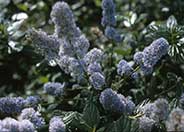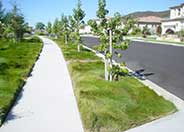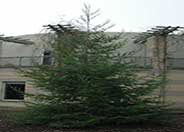

Common name:California Meadow Sedge
Botanical name:Carex pansa
This native Carex can be successfully used as a lawn substitute but requires significant water to obtain good coverage. Once coverage is reached, water can be reduced and maintenance is close to zero. Unmowed, the plant can be used effectively in a variety of conditions and will reach a height of 6" or under and spreads by rhizomes eventually to 2' +.

Common name:Carmel Creeper
Botanical name:Ceanothus griseus horizontalis
Carmel Creeper is one of the most popular forms of spreading shrubs. Its glossy oval leaves of 2" are bright green. The tiny light blue flowers are abundant and form 1" clusters. This shrub benefits from pruning. It does best in well-drained soil with little to no summer water.

Common name:Creeping Red Fescue, Red Fescuegras
Botanical name:Festuca rubra
Creeping Red Fescue is not red but dark green. It is a great ground cover kept at longer lengths for banks. It is very shade tolerant and lush looking.

Common name:Coast Redwood
Botanical name:Sequoia sempervirens
This fast-growing, aromatic tree has soft, dark green foliage with long needles appearing in flat sprays and brown, barrel-shaped cones that appear after 1 year. Its soft, red-brown bark is fiberous and furrowed. Particularly after mechanical damage, this tree will stump sprout to form new, young trees around the stump. Avoid planting in areas of high foot traffic.
Click in the green box for more information
| Designer: Turner Fine Gardens | Trail of Grasses |
Photographer: GardenSoft |
Physical weed control, including mulching, or hand removal protects the watershed from harmful chemicals.
Attract, or buy beneficial insects such as ladybugs and lacewings to control pest outbreaks in your garden.